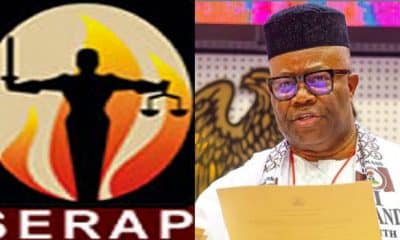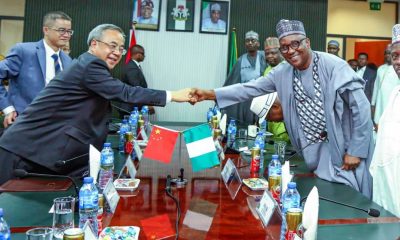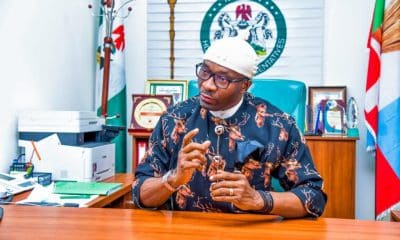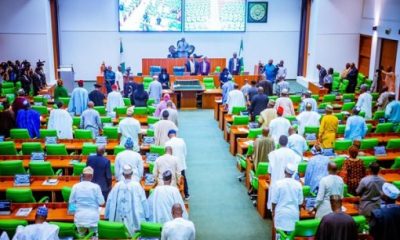Nigeria News
Why There Should Be Citizens’ Participation In Budget Process – Speaker Abbas
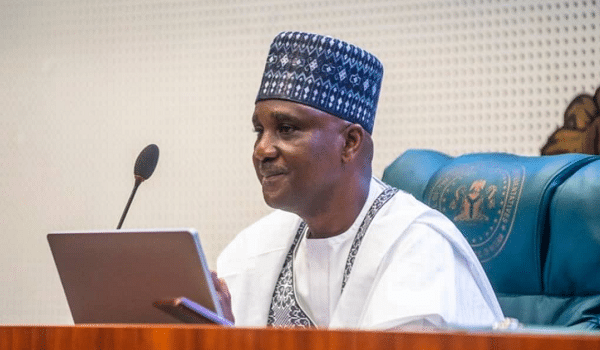
The Speaker of the House of Representatives, Tajudeen Abbas, has urged increased involvement of citizens in the budget process to enhance democratic governance and bolster public financial management in the country.
During a citizens’ town hall on the 2024 Budget and Appropriation Process organized by the House Committee of Appropriations and the programs coordinating unit of the office of the Speaker in Abuja on Monday, December 4, Speaker Tajudeen Abbas emphasized the need for increased citizen participation.
The Speaker highlighted the House’s role in promoting people’s engagement in the budget process and called on all ministries, departments, and agencies to follow suit.
Abbas announced the House’s intention to review the Fiscal Responsibility Act 2007, aiming to strengthen existing provisions to enhance access to information and public consultation throughout all stages of the budget cycle.
In particular, the Speaker declared that the House intends to amend the Fiscal Responsibility Act (FRA) to mandate and define public participation explicitly.
He emphasized that the town hall serves as a direct platform for interaction between legislators and citizens, concentrating on topics related to the national budget.
According to him, this engagement is pivotal for improving the transparency of government spending.
“It also allows the public to be more informed about how public funds are to be used and, by so doing, build greater trust in government institutions. More importantly, however, this town hall will allow the National Assembly to understand citizens’ needs better and explore ways to address them through the budget.”
He said going forward, we will sustain the initiative will be sustained.
He said: “We believe this process should start before the budget is presented to the National Assembly. This is critical to ensuring that the budget becomes the people’s budget. We expect that the 2025 budget will be discussed at the constituency level to ensure greater inclusion and engagement with diverse stakeholders at the grassroots level.”
He emphasized that the significance of this interface is most evident when considering the broader context of declining public trust in government institutions not only in Nigeria but across Africa as a whole.
He said: “The Afrobarometer study across 36 African countries in 2014/2015 on the theme, ‘Do trustworthy institutions matter’ found that people express more trust in informal institutions such as religious and traditional leaders than in the formal executive agencies of the state.
“Public trust in parliaments and electoral institutions was lowest across 36 countries. Similarly, the Open Government Partnership found that Nigeria provides ‘few opportunities for the public to engage in the budget process. In 2017, it ranked Nigeria 13 out of 100 points in public participation.
“This poor ranking was due to the dominant role played by the political elite and government bureaucrats in the budgeting process. While some progress has been made since 2017, many traditional challenges remain. The most notable is the absence of functional government mechanisms that show how citizen input informs the budget-making process.
“This town hall represents a major step in changing the narrative. As indicated in our Legislative Agenda, we are the People’s House. As such, we firmly commit to strengthening public engagement and seeking inputs into the budget process, starting with the pre-budget statement, executive budget proposal, budget debate through public hearings in the legislature, and implementation, monitoring, and reporting of the budget.
“In the last few months, we have engaged various sections of civil society in some of our core activities, including analysis of the MTEF and sectoral debates. This forum demonstrates our willingness to introduce and support feedback mechanisms and seek public input in the 2024 Appropriation.
“However, greater citizen engagement requires action not just by the legislature but more so by the Executive. The Nigeria National Action Plan (2017-2019) under the Open Government Partnership identified the Federal Ministry of Budget and National Planning as the lead institution, with other government organs and agencies and the civil society as support institutions.
“This places the burden for improving public participation in the budget largely on the Executive. Some of the ways to achieve this include regular publishing of MDA budgets and quarterly and annual budget implementation reports on their websites, annual publishing of a comprehensive citizen’s guide to the budget, conduct of annual citizen’s satisfaction survey and timely publication and dissemination of all key budget documents to facilitate citizens’ participation.”
The Speaker asserted that, as representatives of the people, it is their responsibility to ensure that the annual appropriation accurately mirrors the needs and aspirations of every Nigerian citizen.
He encouraged lawmakers to diligently follow up with oversight supervision once the appropriation is passed, emphasizing that their active involvement can significantly contribute to strengthening and improving legislative oversight.
Kalu stated: “We will leverage your expertise to ensure that budget implementation aligns with legislative intent.”
Deputy Speaker Benjamin Kalu expressed assurance that the House, committed to citizens’ welfare, will thoroughly examine and ensure the responsible and effective use of public resources in the 2024 budget.
He encouraged the public to actively participate in the budgetary process actively, highlighting the invaluable contribution of their insights and perspectives in shaping a budget that genuinely serves the interests of the Nigerian populace.
The Chairman of the House Committee on Appropriation, Abubakar Bichi, emphasized that, while exercising its coordinating powers in the Appropriations process, the Committee will maintain an open-door policy to accommodate the interests of stakeholders.
This approach aims to make the process more credible, people-oriented, and a reliable instrument for good governance.
Bichi affirmed the Committee’s commitment to upholding the principles of the 10th House’s Legislative Agenda, ensuring an effective and participatory budget process that guarantees efficient service delivery by the Ministries, Departments, and Agencies (MDAs).
He further highlighted the National Assembly’s dedication to a transparent, inclusive, and progressive budgeting system, citing the organized engagement as an opportunity for citizens’ participation.
Sani Tambuwal, the Clerk of the National Assembly, added that the House’s approach to the national budget and appropriation process is designed to enhance inclusivity, citizen participation, openness, and transparency.
He expressed optimism that, if consistently followed, this approach would lead to improved budget performance and accountability.

![[JUST IN] Full List: Reps Inaugurate 21-Member Ad-hoc Committee To Oversee Rivers Administration](https://www.naijanews.com/wp-content/uploads/2024/04/Abbas-Tajudeen-400x240.jpg)
![[JUST IN] Full List: Reps Inaugurate 21-Member Ad-hoc Committee To Oversee Rivers Administration](https://www.naijanews.com/wp-content/uploads/2024/04/Abbas-Tajudeen-80x80.jpg)
